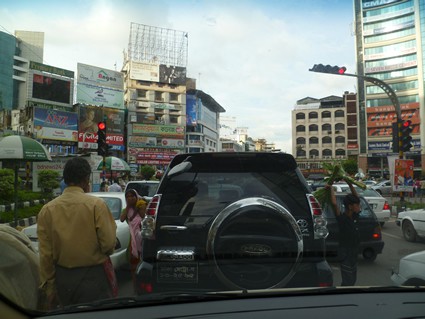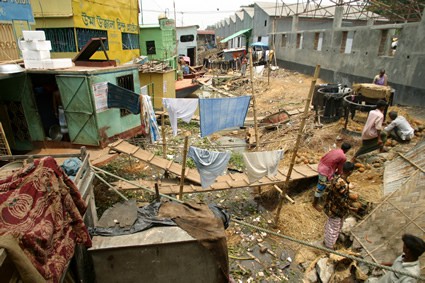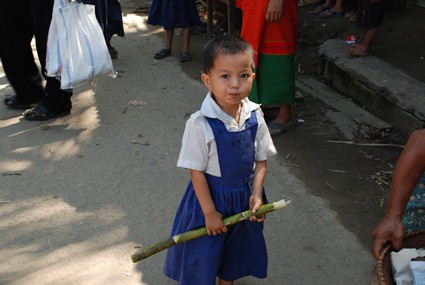Dirty, gnarled, even missing hands that press against the window of
the van. Dark and insistent, sometimes pleading, sometimes indignant
eyes staring right into you, deep into you, as you wait for the traffic
to move on so they will give up on you.

I sit in a heavy traffic jam in a roundabout in Dhaka, Bangladesh. And once more the van is surrounded by beggars.
A mother with a naked baby, a woman who looks very old but probably
isn’t. A boy holding up another who has a huge growth on his abdomen.
And others, all looking so desperate, so far from the image of God that
they were created to be. And I want so hard to ignore them.
I just want them to go away.
But I’ve just read a friend’s book about Matthew 25, the sheep and
the goats, the day before arriving in Bangladesh. As it turns out, it’s a
rather convicting combination – the words of Jesus and a face-to-face
encounter with the desperate poor. And so I have to do something.
I know it will bring even more desperate souls to our very stuck van, but I look to Thomas, the driver. He lowers the window a bit and I start to hand out Takas – 100 here, 10 there.
It doesn’t really add up to much and I wonder why I haven’t done this
before. Perhaps because, before, I didn’t have the image in my heart of
Jesus saying,
“This is me. I am the hungry, I am the sick, I am the least of these. What will you do?”
I was also just so weary, returning to the hotel each night with
images of the poor, of people robbed of health and hope and dignity. I
was tired of feeling numb to it during the day, and haunted by it at
night as I lay in bed wondering if I should have done something. It was
eating away at me.
People weren’t meant to live like this. And that, I think, is what
Jesus was trying to get us to not only understand, but to feel and to
feel deeply.
So the next day, here I am again. And like the day before, there are more heartbreaking scenes.

A young boy pushes a man who is not much more than a skeleton in a
wheel chair. A woman with hollow, sunken eyes taps on my window, hoping
for a moment of charity.
A man too sick to beg is sprawled face down in the dirt by the side
of the road as streams of commuters walk around him. He doesn’t move. He
doesn’t move at all.
And I find myself trying to be numb again. Somehow the fear has returned: If I help this one then the line will never stop.
Five thousand will line up and the loaves and fish will run out and
I’ll be left with nothing and still they will come. I don’t know what to
do with this. I don’t know how to respond.
One day they are the image of Jesus. The next day His image slips
away. And I realize the horror of those who will one day ask Jesus,
“When did we see you hungry?”
There is great beauty, too, in Bangladesh. Beauty that contrasts so
starkly with the sorrow. It highlights the injustice of poverty, the
inequality of it all that conspires to destroy the lives of people
created and loved by God.
That such sorrow continues to destroy so many lives is an affront to the One who created us all.
So how do we respond to such entrenched need? Such injustice? Because
regardless of our politics or our theology, it is injustice that a
child is born into extreme poverty.

It is injustice that he becomes sick and cannot afford to be treated.
That his sickness leads to a disfigurement and his disfigurement leads
to rejection. That he is doomed to a life of begging in the dust. And
that nothing he can do can change that.
No matter what we might believe, this is not right. This is not fair.
And man, it all just aches inside – especially in the alone and quiet moments.
But if the choice is between the heartache or the numbness, we must
choose the heartache. We must trust that it will lead us to a godly
response and to the God who chose solidarity with “the least of these.”
Because to protect ourselves with numbness is to surrender a vital
part of our souls that a Christian cannot afford to forfeit. And to feel
the ache compels us to ask some very hard questions.
Questions about how much we believe. Because, in the end, we should
want our faith to be alive – and so the words of James haunt us through
time: “Faith without works is dead” (see James 2:14-26).
It is so easy to argue away the theology when we are safe and
comfortable in the pews of suburbia, but so much different on the
streets of Dhaka – a place that cries out for the pure religion that God
accepts.
I still wrestle with how I did not change the lives of so many of the
people I came across in Bangladesh. How easy it is to judge the priest
and the Levite until you are the one who comes across the man lying in
the street (or tapping on the window).
And then, then it is so much easier to look away or to cross the street to the other side.
So while we may wish, in the moment, that these poor souls would just
move on, that they would see us in our hurry and give up on us for
someone more charitable, in the end it would be so very tragic if they —
these souls who are so close to God’s own heart – were to give up on
us.
ABOUT THE AUTHOR: Christopher Delvaille works as a
senior strategy and planning advisor at Compassion’s Global Ministry
Center in Colorado Springs, Colo.
No comments:
Post a Comment